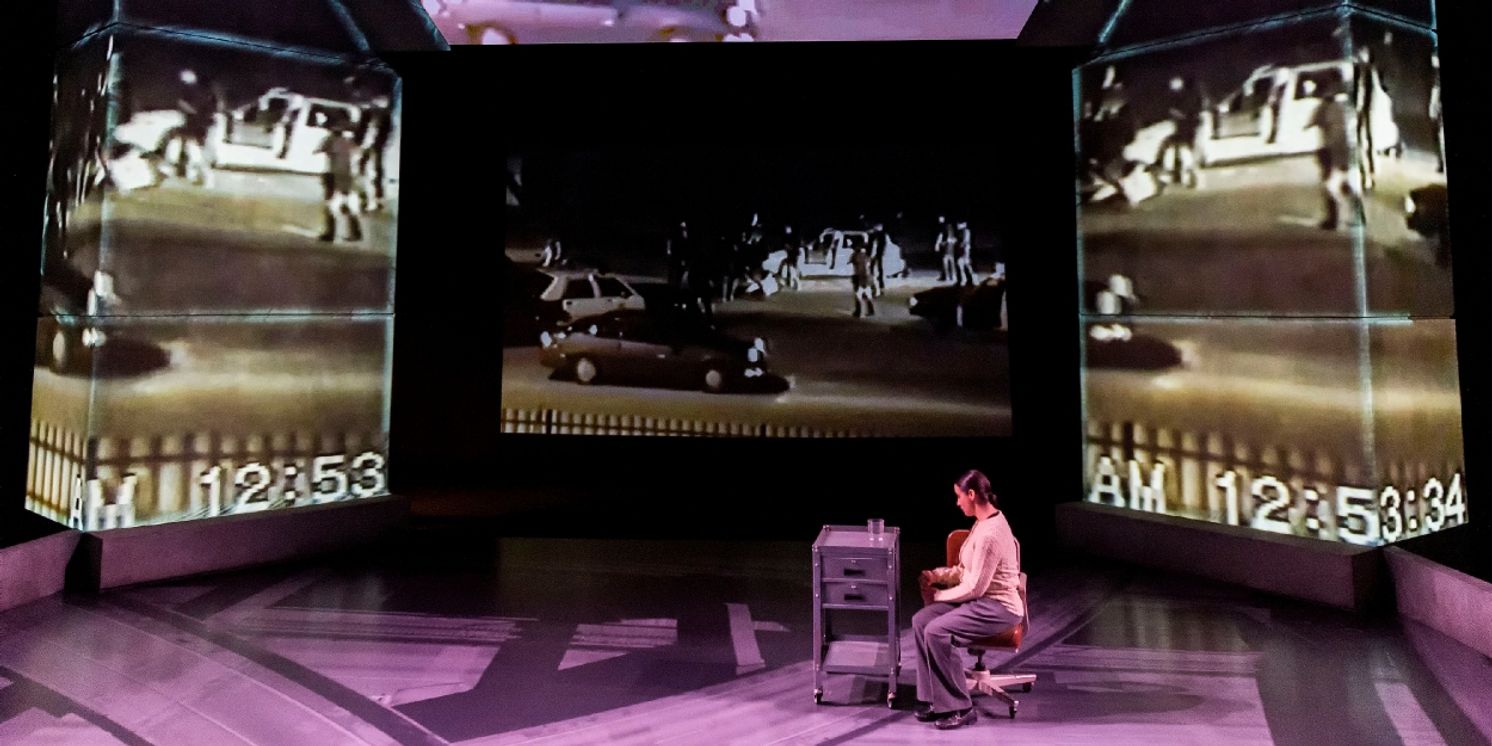Review: TWILIGHT: LOS ANGELES 1992 at Mark Taper Forum
30th-anniversary production struggles with immediacy.

Three decades later, that home-shot footage remains as revolting and shocking as ever. Forget, for the moment, any acts of dramatization or reenactment. If you watch the new revival of TWILIGHT: LOS ANGELES, 1992, Anna Deavere Smith's investigative odyssey of the 1992 L.A. riots currently at the Mark Taper Forum, you will witness both George Holliday's amateur videos of four LAPD officers beating motorist Rodney King and - later - news footage from L.A. News Service reporter Judith Tur as she narrates the beating of trucker Reginald Denny. "This is not my United States anymore," Tur (played by Sabina Zuniga Varela) says. "This is sicko. This is like being in a war zone."
Damned straight, it is. Whether you are seeing it for the first time or reliving the news from three decades ago when a Simi Valley jury said "not guilty" and the city of L.A. exploded, this is tough bit of our city's inglorious history to revisit. As numb has many of us may have subsequently become after reading about and watching act so many instances of police brutality, the King footage (silent and grainy though it is) still feels like a snuff film. Playwright Smith knew that the story she set out tell through those hundreds of interviews still had resonance. Particularly in the aftermath of George Floyd's murder in 2021.
Floyd's death and the many subsequent incidents that have fueled the Black Lives Matters movement has opened up TWILIGHT to new audiences, and the playwright has worked to connect the dots with mixed success. Having begun as a solo performance and an important bit of docu-theater, the updated TWILIGHT, is now a vehicle for five actors that includes an added monolog referencing Floyd. After previous productions at ART and Signature Stage, the play has returned home to the Taper, the site of its world premiere in 1993, in a production directed by Gregg T. Daniel. As solidly staged and forcefully acted as this TWILIGHT is, the production is both problematic and comes across feeling like something is missing.
That something may well be Smith herself. Not having seen the original production live, I can only speculate about the impact of watching an interviewer and actor of Anna Deavere Smith's caliber engaging with the words and personas of the people she interviewed to create this play. This is not to in any way slight performers Hugo Armstrong, Lovensky Jean-Baptiste, Lisa Renee Pitts, Jeanne Sakata and Sabina Zuniga Varela, all excellent actors who wear many the many personas of TWILIGHT with sensitivity, intelligence and grace. Now, as reworked, there are instances where it feels like the multiple ages, genders and ethnicities depicted in TWILIGHT are bouncing off and speaking to each other when their dialog should more appropriately be with the audience. Five actors means different staging or - in the case of Daniels' production - over-staging.
Select monologs are now bifurcated and presented by multiple actors. Most notably Cornel West's second act-opening "Chekhov/Coltrane" that the entire cast tosses around collegially. And why so much time with Elaine Young, the plastic surgery addicted real estate agent to the stars who received plenty of flak for talking about how she "hid out" in the Polo Lounge of the Beverly Hills Hotel "'cause it was like a fortress." Baptiste, Armstrong and Varela shtickily share this clueless character, each donning Young's glasses, scarf and scrapbook.
And late in the play, under the heading "A dinner party that never happened," Chez Panisse chef Alice Waters hosts a gathering for Free the L.A. Four Plus Defense Committee chair Paul Parker, New Jersey Senator Bill Bradley, shopkeeper Jin Ho Lee and former Black Panther Party Chair Elaine Brown. Through the construction and placement of these monologs, it's supposed to feel like a dialog is taking place. Instead, the proceedings feel contrived and a bit pedantic.
The beauty of TWILIGHT is its scope. Through the collection of her more than 320 interviews, Smith is recounting not just a memory play about the riots or a meditation on black/white race relations or civilian/police relations. This portrait of a major city at an inflection point spins out to confront the 1991 shooting to Latasha Harlins and moves forward to incorporate Hector Tobar's connecting the dots between 1992 and the murder George Floyd. We hear from civic leaders, artists, gun control advocates, bystanders, jurors, an astonishing spectrum. Smith is painting on an enormous, occasionally unwieldy canvas that she has opened to revision. We never hear the words of Rodney King, but we hear from his aunt, Angela King and from Ted Briseno, one of the officers accused of beating him. Reginald Denny is portrayed, speaking words of such amazing kindness and optimism (delivered by Armstrong), it could bring you to tears. Sakata's rendering of the Park family - store owner Walter, his wife June and stepson Chris Oh - is similarly affecting. And in the two instances when she takes on the persona of Congresswoman Maxine Waters, Pitts demonstrates the impact of a political voice in time of crisis.
Although the work of the actors never lets us forget that we are hearing about people's lives, there is a docudrama feel to TWILIGHT the proceedings as well. In addition to displaying photos and videos from the riots, Yee Eun Nam's projections supply data including numbers of people injured, ethnic breakdown and financial costs: 63 deaths, 2,300 injured, 12,111 arrested, $753 million in property damage and 1,573 buildings completely destroyed.
Those numbers, like the video and the words of the participants are more sobering than they are piercing. The revised TWILIGHT hits hard, but doesn't leave scars.
Photo Credit: Craig Schwartz
Tickets to TWILIGHT and to more than 75 additional productions are also available now during LA Theatre Week. https://www.theatreweek.com/los-angeles/
Reader Reviews

Videos

